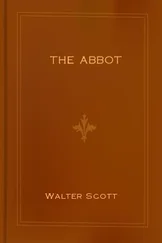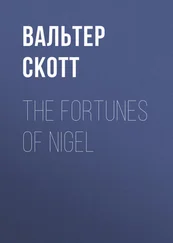Walter Scott - The Fortunes of Nigel
Здесь есть возможность читать онлайн «Walter Scott - The Fortunes of Nigel» весь текст электронной книги совершенно бесплатно (целиком полную версию без сокращений). В некоторых случаях можно слушать аудио, скачать через торрент в формате fb2 и присутствует краткое содержание. Год выпуска: 2004, Жанр: Исторические приключения, на английском языке. Описание произведения, (предисловие) а так же отзывы посетителей доступны на портале библиотеки ЛибКат.
- Название:The Fortunes of Nigel
- Автор:
- Жанр:
- Год:2004
- ISBN:нет данных
- Рейтинг книги:3 / 5. Голосов: 1
-
Избранное:Добавить в избранное
- Отзывы:
-
Ваша оценка:
- 60
- 1
- 2
- 3
- 4
- 5
The Fortunes of Nigel: краткое содержание, описание и аннотация
Предлагаем к чтению аннотацию, описание, краткое содержание или предисловие (зависит от того, что написал сам автор книги «The Fortunes of Nigel»). Если вы не нашли необходимую информацию о книге — напишите в комментариях, мы постараемся отыскать её.
—SIR PHILIP SIDNEY
The Fortunes of Nigel — читать онлайн бесплатно полную книгу (весь текст) целиком
Ниже представлен текст книги, разбитый по страницам. Система сохранения места последней прочитанной страницы, позволяет с удобством читать онлайн бесплатно книгу «The Fortunes of Nigel», без необходимости каждый раз заново искать на чём Вы остановились. Поставьте закладку, и сможете в любой момент перейти на страницу, на которой закончили чтение.
Интервал:
Закладка:
Note II. p. 27.-GEORGE HERIOT
This excellent person was but little known by his actions when alive, but we may well use, in this particular, the striking phrase of Scripture, "that being dead he yet speaketh." We have already mentioned, in the Introduction, the splendid charity of which he was the founder; the few notices of his personal history are slight and meagre.
George Heriot was born at Trabroun, in the parish of Gladsmuir; he was the eldest son of a goldsmith in Edinburgh, descended from a family of some consequence in East Lothian. His father enjoyed the confidence of his fellow-citizens, and was their representative in Parliament. He was, besides, one of the deputies sent by the inhabitants of the city to propitiate the King, when he had left Edinburgh abruptly, after the riot of 17th December, 1596.
George Heriot, the son, pursued his father's occupation of a goldsmith, then peculiarly lucrative, and much connected with that of a money-broker. He enjoyed the favour and protection of James, and of his consort, Anne of Denmark. He married, for his first wife, a maiden of his own rank, named Christian Marjoribanks, daughter of a respectable burgess. This was in 1586. He was afterwards named jeweller to the Queen, whose account to him for a space of ten years amounted to nearly L40,000. George Heriot, having lost his wife, connected himself with the distinguished house of Rosebery, by marrying a daughter of James Primrose, Clerk to the Privy Council. Of this lady he was deprived by her dying in child-birth in 1612, before attaining her twenty-first year. After a life spent in honourable and successful industry, George Heriot died in London, to which city he had followed his royal master, on the 12th February, 1624, at the age of sixty-one years. His picture, (copied by Scougal from a lost original,) in which he is represented in the prime of life, is thus described: "His fair hair, which overshades the thoughtful brow and calm calculating eye, with the cast of humour on the lower part of the countenance, are all indicative of the genuine Scottish character, and well distinguish a person fitted to move steadily and wisely through the world, with a strength of resolution to ensure success, and a disposition to enjoy it."— Historical and Descriptive Account of Heriot's Hospital, with a Memoir of the Founder, by Messrs James and John Johnstone. Edinburgh, 1827.
I may add, as every thing concerning George Heriot is interesting, that his second wife, Alison Primrose, was interred in Saint Gregory's Church, from the register of which parish the Rev. Mr. Barham, Rector, has, in the kindest manner, sent me the following extract:—"Mrs. Alison, the wife of Mr. George Heriot, gentleman, 2Oth April, 1612." Saint Gregory's, before the Great Fire of London which consumed the Cathedral, formed one of the towers of old Saint Paul's, and occupied the space of ground now filled by Queen Anne's statue. In the south aisle of the choir Mrs. Heriot reposed under a handsome monument, bearing the following inscription:—
_"Sanctissimae et charissimae conjugi ALISONAE HERIOT, Jacobi Primrosii, Regia Majestatis in Sanctiori Concilio Regni Scotia Amanuensis, filiae, fernina omnibus turn animi turn corporis dotibus, ac pio cultu instructissimae, maestissimus ipsius maritus GEORGIUS HERIOT, ARMIGER, Regis, Reginae, Principum Henrici et Caroli Gemmarius, bene merenti, non sine lachrymis, hoc Monumentum pie posuit.
"Obiit Mensis Aprilis die 16, anno salutis 1612, aetatis 20, in ipso flore juventae, et mihi, parentibus, et amicis tristissimum sui desiderium reliquit.
Hic Alicia Primrosa
Jacet crudo abruta fato,
Intempestivas
Ut rosa pressa manus.
Nondum bisdenos
Annorum impleverat orbes,
Pulchra, pudica,
Patris delicium atque viri:
Quum gravida, heu! Nunquam
Mater, decessit, et inde
Cura dolorq: Patri,
Cura dolorq: viro.
Non sublata tamen
Tantum translata recessit;
Nunc Rosa prima Poli
Quae fuit antea soli."_
The loss of a young, beautiful, and amiable partner, at a period so interesting, was the probable reason of her husband devoting his fortune to a charitable institution. The epitaph occurs in Strype's edition of Stewe's Survey of London , Book iii., page 228.
Note III. p. 39.—PROCLAMATION AGAINST THE SCOTS COMING TO ENGLAND
The English agreed in nothing more unanimously than in censuring James on account of the beggarly rabble which not only attended the King at his coming first out of Scotland, "but," says Osborne, "which, through his whole reign, like a fluent spring, were found still crossing the Tweed." Yet it is certain, from the number of proclamations published by the Privy Council in Scotland, and bearing marks of the King's own diction, that he was sensible of the whole inconveniences and unpopularity attending the importunate crowd of disrespectable suitors, and as desirous to get rid of them as his Southern subjects could be. But it was in vain that his Majesty argued with his Scottish subjects on the disrespect they were bringing on their native country and sovereign, by causing the English to suppose there were no well- nurtured or independent gentry in Scotland, they who presented themselves being, in the opinion and conceit of all beholders, "but idle rascals, and poor miserable bodies." It was even in vain that the vessels which brought up this unwelcome cargo of petitioners were threatened with fine and confiscation; the undaunted suitors continued to press forward, and, as one of the proclamations says, many of them under pretence of requiring payment of "auld debts due to them by the King," which, it is observed with great naivete , "is, of all kinds of importunity, most unpleasing to his Majesty." The expressions in the text are selected from these curious proclamations.
NOTE IV. p. 59.—KING JAMES
The dress of this monarch, together with his personal appearance, is thus described by a contemporary:—
"He was of a middle stature, more corpulent through [i.e. by means of] his clothes than in his body, yet fat enough. His legs were very weak, having had, as was thought, some foul play in his youth, or rather before he was born, that he was not able to stand at seven years of age. That weakness made him ever leaning on other men's shoulders. His walk was even circular; his hands are in that walk ever fiddling about——[a part of dress now laid aside]. He would make a great deal too bold with God in his passion, both with cursing and swearing, and a strain higher verging on blasphemy; but would, in his better temper, say, he hoped God would not impute them as sins, and lay them to his charge, seeing they proceeded from passion. He had need of great assistance, rather than hope, that would daily make thus bold with God."—DALZELL'S Sketches of Scottish History , p. 86.
NOTE V. p. 78.—SIR MUNGO MALAGROWTHER
It will perhaps be recognised by some of my countrymen, that the caustic Scottish knight, as described in the preceding chapter, borrowed some of his attributes from a most worthy and respectable baronet, who was to be met with in Edinburgh society about twenty-five or thirty years ago. It is not by any means to be inferred, that the living person resembled the imaginary one in the course of life ascribed to him, or in his personal attributes. But his fortune was little adequate to his rank and the antiquity of his family; and, to avenge himself of this disparity, the worthy baronet lost no opportunity of making the more avowed sons of fortune feel the edge of his satire. This he had the art of disguising under the personal infirmity of deafness, and usually introduced his most severe things by an affected mistake of what was said around him. For example, at a public meeting of a certain county, this worthy gentleman had chosen to display a laced coat, of such a pattern as had not been seen in society for the better part of a century. The young men who were present amused themselves with rallying him on his taste, when he suddenly singled out one of the party:—"Auld d'ye think my coat— auld-fashioned?—indeed it canna be new; but it was the wark of a braw tailor, and that was your grandfather, who was at the head of the trade in Edinburgh about the beginning of last century." Upon another occasion, when this type of Sir Mungo Malagrowther happened to hear a nobleman, the high chief of one of those Border clans who were accused of paying very little attention in ancient times to the distinctions of Meum and Tuum, addressing a gentleman of the same name, as if conjecturing there should be some relationship between them, he volunteered to ascertain the nature of the connexion by saying, that the "chief's ancestors had stolen the cows, and the other gentleman's ancestors had killed them,"—fame ascribing the origin of the latter family to a butcher. It may be well imagined, that among a people that have been always punctilious about genealogy, such a person, who had a general acquaintance with all the flaws and specks in the shields of the proud, the pretending, and the nouveaux riches, must have had the same scope for amusement as a monkey in a china shop.
Читать дальшеИнтервал:
Закладка:
Похожие книги на «The Fortunes of Nigel»
Представляем Вашему вниманию похожие книги на «The Fortunes of Nigel» списком для выбора. Мы отобрали схожую по названию и смыслу литературу в надежде предоставить читателям больше вариантов отыскать новые, интересные, ещё непрочитанные произведения.
Обсуждение, отзывы о книге «The Fortunes of Nigel» и просто собственные мнения читателей. Оставьте ваши комментарии, напишите, что Вы думаете о произведении, его смысле или главных героях. Укажите что конкретно понравилось, а что нет, и почему Вы так считаете.






